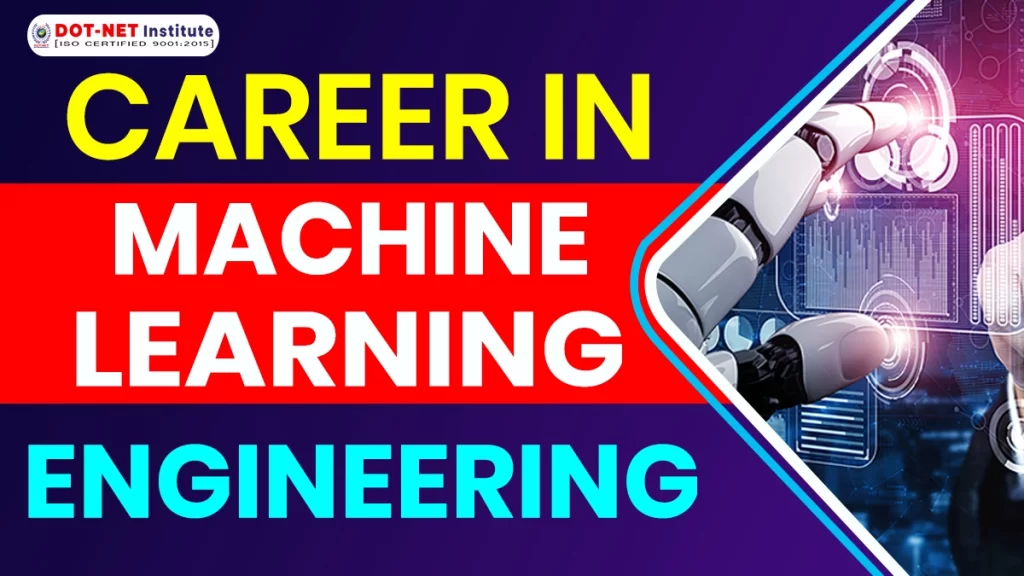Are you interested in a career in Machine learning Engineering, but completely unaware of where to begin with? This job role isn’t even an entry-level kind of tech job rather a career in Machine Learning Engineering is exciting and rewarding. Machine learning is an interesting branch of AI that predicts and adapts results as data is received. There has been an exponential growth in the demand for machine learning engineers in recent years which makes it the 5th most in-demand job in 2023. So, without any further delay let’s learn about the career in Machine Learning Engineering in detail!!
Contents
What is machine Learning Engineering?
Machine Learning is a branch of computer science that specifically deals with AI. Algorithms are used to interpret data in such a way as to replicate how humans work. The main objective of the machine is to enhance its learning accuracy and provide data-based information to the user.
Machine learning engineering is used everywhere from face lock on your smartphone to video surveillance. Its technology is also used by customers-facing businesses to have a better understanding of customers’ preferences and patterns before directing a marketing campaign towards them.
Meta, a popular social media platform also uses machine learning engineering to target ads according to their users’ preferences, posts and likes to their websites. Similarly, shopping websites like Flipkart and Amazon also incorporate machine learning technology to suggest items for buying according to customers’ purchase history and preferences.
Also read: 10 ऐसी jobs future के लिए जिसका AI कुछ नही बिगाड़ सकती
What is the Job role of a Machine learning Engineer?

Machine learning Engineers are a crucial part of the data science team. Their responsibilities involve researching, designing and building AI responsible for machine learning and improving and maintaining existing AI systems. They are often as main communicator between the data science team members and they work directly with the data scientists who do the development of models for building AI systems and the people who run and construct them.
Main job responsibilities of Machine learning Engineer:
- They implement a machine-learning algorithm
- They run AI systems for tests and experiments
- They develop and design a machine learning system
- They perform statistical analysis
Job opportunities for Machine learning Engineers
The computer science field is continually growing over the past few decades. A study done by the US Bureau of Labor Statistics, states that computer science research and information jobs will likely grow 23% per cent by 2032 which is much faster than all average occupations.
Indeed, a popular Job search portal ranks Machine learning Engineer jobs in its Top 10 ranking based on the number of postings and growth in the ML and AI field over the past 3 years. This is also because of the aftermath of the COVID-19 pandemic which increased the demand for improved automation of daily routine tasks at all times.
Salary of a Machine Learning Engineer

A career in Machine learning Engineering is pretty lucrative. The salary of a Machine learning Engineer is significantly higher than the national average like other high-level tech jobs. Their salaries are often over six figures. According to Indeed, the machine learning Engineer average as of October 2023 is $160,471.
Also read: The Impact of Artificial Intelligence (AI) on the future work
How to start your career as a Machine learning Engineer?
There are 3 essential steps, you need to follow to become a successful machine learning engineer:
1. Get a bachelor’s degree in computer science in a similar field
You need a strong background in data science, computer programming and maths because machine learning is a part computer science field. A bachelor’s degree in computer science is a minimum qualification required to become a machine learning engineer. You can also study courses that are closely related to the computer science field like statistics to achieve success.
2. Gain experience through Entry-level work
Once you complete your computer science degree then start working in the field of data science to gain working experience with AI and machine learning. These are some entry-level jobs in Machine learning career:
- Data scientist
- Software Engineer
- Computer Engineer
- Software Developer
3. Build your expertise in machine learning Engineering
Even if you haven’t landed a machine learning engineering role yet, there are steps you can take to gain valuable experience. Look for opportunities in related fields, such as data analysis or software development, to build your foundation. Take the initiative to contribute to machine learning projects within your current role, allowing you to hone your practical skills. Additionally, consider pursuing relevant certifications to demonstrate your commitment to the field and strengthen your professional profile. By taking these proactive measures, you can equip yourself with the expertise necessary to make a successful transition into machine learning engineering.
Get an Advanced degree
While a bachelor’s degree can suffice for entry into the field of data science and artificial intelligence, pursuing a master’s degree or PhD in computer science, data science, or software engineering can give you a significant edge. These advanced degrees equip you with the knowledge and skills to tackle more complex tasks, particularly those faced by machine learning engineers. Additionally, they can enhance your job prospects, especially when coupled with relevant industry experience gained through internships or apprenticeships. This combination of academic rigour and practical exposure strengthens your candidacy in a competitive job market.
Also check:
-
5 Best Computer Course in India for Private Job (India में प्राइवेट नौकरी के लिए 05 BEST कंप्यूटर कोर्स)
-
Google jobs in India | Google में चाहिए नौकरी तो कर ये 5 कोर्स - मिलेगा लाखों का पैकेज | Google Jobs
-
Retail Management Career | Retail Jobs | How to get Retail Management Job
-
How to Start Earning as a Graphic Designer?
-
Paramedical Courses | Paramedical Career | कम बजटऔर कम फीस में मेडिकल करियर बनेगा
Conclusion
The exciting fields of artificial intelligence and machine learning are rapidly expanding within computer and data science. While becoming a machine learning engineer requires dedication and years of learning, you can take the first steps today! Start by solidifying your software development knowledge. Explore various programming languages, and consider pursuing an initial bachelor’s degree.
Also check: https://www.youtube.com/watch?v=9SFarwG9TX0
FAQs
Machine Learning Engineers are responsible for the entire lifecycle of machine learning models, from data collection and cleaning to model deployment and monitoring. They build, train, and test these models to solve specific problems and ensure they perform effectively in real-world scenarios.
Strong foundations in mathematics, statistics, and computer science are crucial. Programming languages like Python are essential, along with knowledge of machine learning algorithms and frameworks. Additionally, data visualization skills, big data expertise, and the ability to work effectively with teams are valuable assets.
While a Bachelor’s degree in computer science, data science, or a related field is preferred, some individuals enter the field through self-learning and portfolio building. Relevant work experience, internships, or participation in online courses and bootcamps can also be valuable.
Machine learning is a fastest growing field with high demand for skilled working professionals. Job opportunities exist across various industries, including finance, healthcare, retail, and technology. The field offers competitive salaries and promising career growth potential.
Some challenges include dealing with large and messy datasets, ensuring model fairness and avoiding bias, and keeping up with the rapid advancement of the field. Additionally, explaining complex models to non-technical stakeholders can be a challenge.
Numerous online courses, tutorials, and bootcamps are available on platforms like Coursera, edX, and Udacity. Additionally, attending industry conferences, workshops, and webinars can provide valuable insights and networking opportunities.


